Leeds Trinity University: Business Operations Reflecting Report
VerifiedAdded on 2023/02/01
|8
|2187
|69
Report
AI Summary
This report reflects on a student's learning journey within the 'Introduction to Business Operations and Management' module at Leeds Trinity University. The report begins with an introduction to business operations and management, defining key concepts and outlining the module's objectives. It then provides a review of the first semester, detailing the student's initial knowledge gaps and the concepts learned, including business types, quality control, and management skills. The second semester review highlights the application of first-semester knowledge and discusses continuous improvement, addressing challenges encountered. The report emphasizes the importance of management, quality control, and HR management, the topics that the student found most fascinating. It also identifies areas for further study, such as HR strategies and quality control. The conclusion emphasizes the dynamic nature of business and the need for ongoing learning to understand the complexities of the real business world. The report reflects on the module's comprehensive overview of fundamental business activities and the need for more practical applications of the concepts learned.
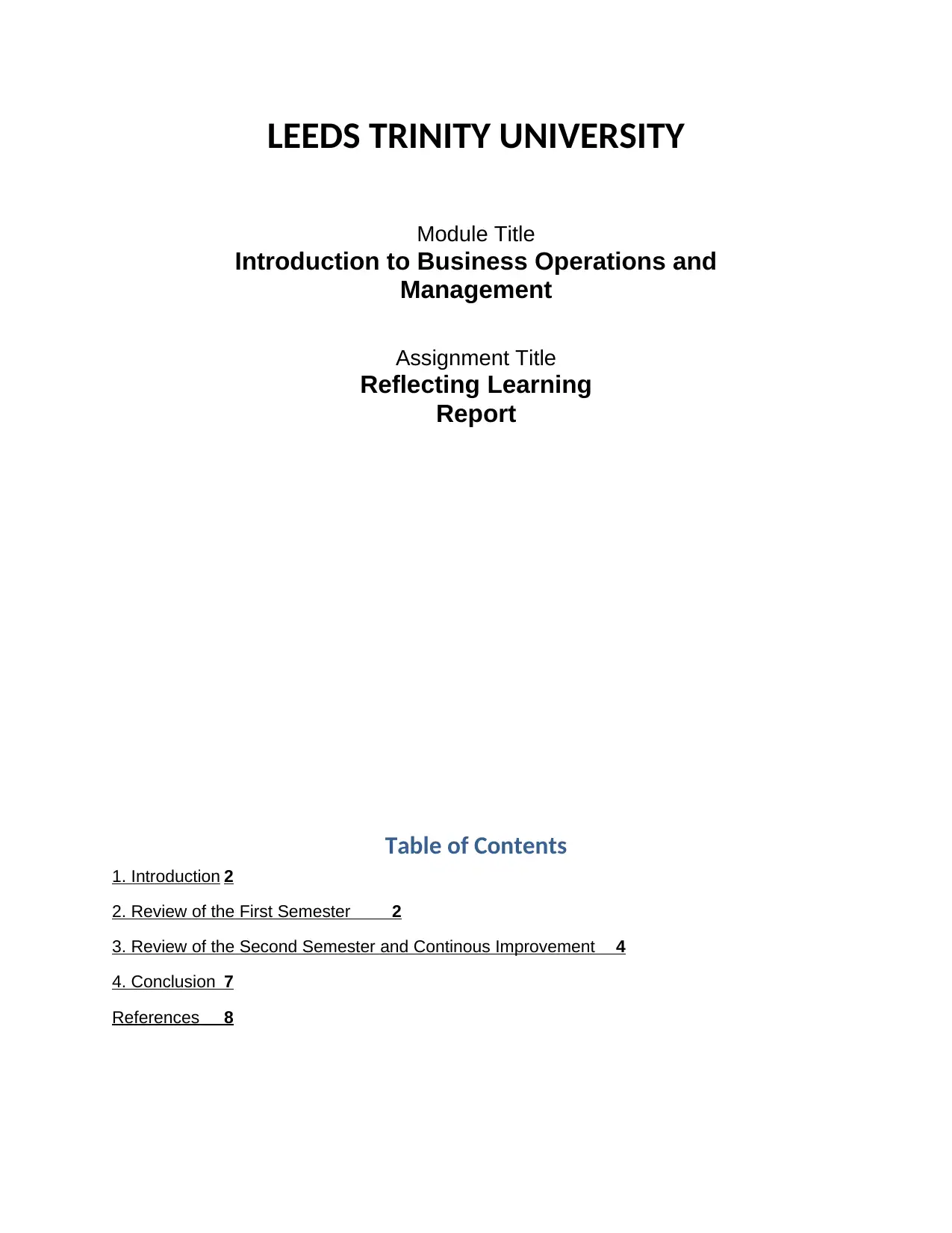
LEEDS TRINITY UNIVERSITY
Module Title
Introduction to Business Operations and
Management
Assignment Title
Reflecting Learning
Report
Table of Contents
1. Introduction 2
2. Review of the First Semester 2
3. Review of the Second Semester and Continous Improvement 4
4. Conclusion 7
References 8
Module Title
Introduction to Business Operations and
Management
Assignment Title
Reflecting Learning
Report
Table of Contents
1. Introduction 2
2. Review of the First Semester 2
3. Review of the Second Semester and Continous Improvement 4
4. Conclusion 7
References 8
Paraphrase This Document
Need a fresh take? Get an instant paraphrase of this document with our AI Paraphraser
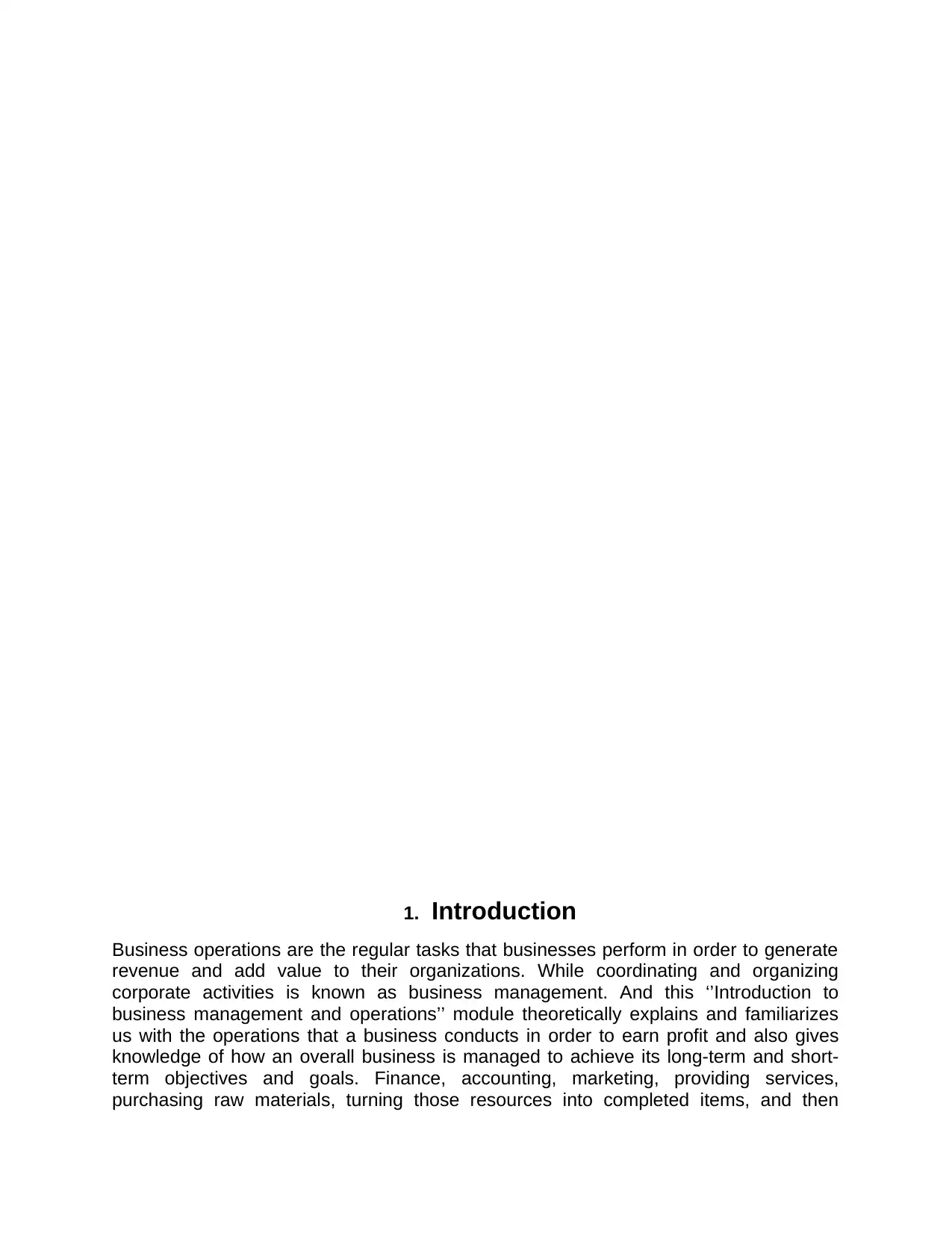
1. Introduction
Business operations are the regular tasks that businesses perform in order to generate
revenue and add value to their organizations. While coordinating and organizing
corporate activities is known as business management. And this ‘’Introduction to
business management and operations’’ module theoretically explains and familiarizes
us with the operations that a business conducts in order to earn profit and also gives
knowledge of how an overall business is managed to achieve its long-term and short-
term objectives and goals. Finance, accounting, marketing, providing services,
purchasing raw materials, turning those resources into completed items, and then
Business operations are the regular tasks that businesses perform in order to generate
revenue and add value to their organizations. While coordinating and organizing
corporate activities is known as business management. And this ‘’Introduction to
business management and operations’’ module theoretically explains and familiarizes
us with the operations that a business conducts in order to earn profit and also gives
knowledge of how an overall business is managed to achieve its long-term and short-
term objectives and goals. Finance, accounting, marketing, providing services,
purchasing raw materials, turning those resources into completed items, and then
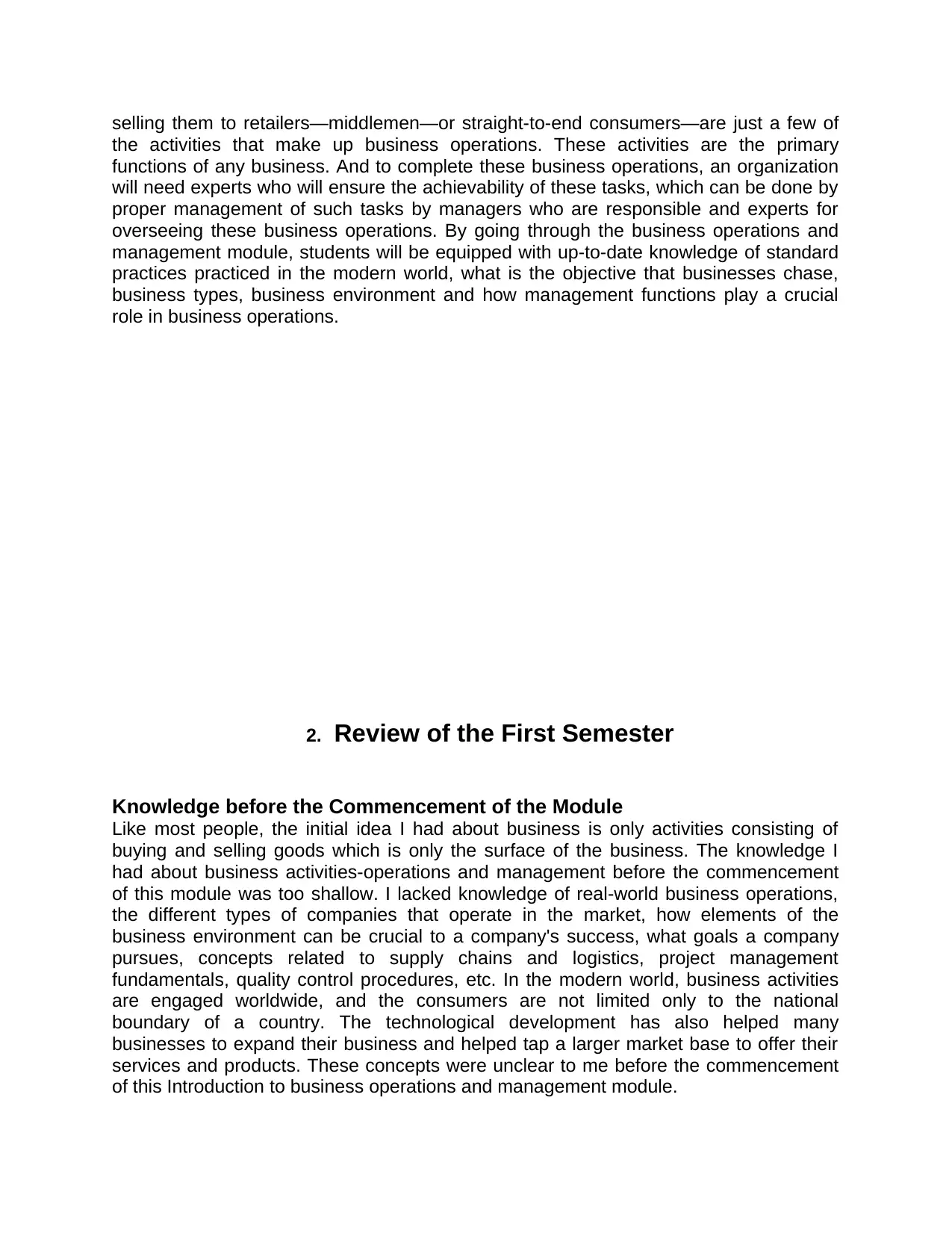
selling them to retailers—middlemen—or straight-to-end consumers—are just a few of
the activities that make up business operations. These activities are the primary
functions of any business. And to complete these business operations, an organization
will need experts who will ensure the achievability of these tasks, which can be done by
proper management of such tasks by managers who are responsible and experts for
overseeing these business operations. By going through the business operations and
management module, students will be equipped with up-to-date knowledge of standard
practices practiced in the modern world, what is the objective that businesses chase,
business types, business environment and how management functions play a crucial
role in business operations.
2. Review of the First Semester
Knowledge before the Commencement of the Module
Like most people, the initial idea I had about business is only activities consisting of
buying and selling goods which is only the surface of the business. The knowledge I
had about business activities-operations and management before the commencement
of this module was too shallow. I lacked knowledge of real-world business operations,
the different types of companies that operate in the market, how elements of the
business environment can be crucial to a company's success, what goals a company
pursues, concepts related to supply chains and logistics, project management
fundamentals, quality control procedures, etc. In the modern world, business activities
are engaged worldwide, and the consumers are not limited only to the national
boundary of a country. The technological development has also helped many
businesses to expand their business and helped tap a larger market base to offer their
services and products. These concepts were unclear to me before the commencement
of this Introduction to business operations and management module.
the activities that make up business operations. These activities are the primary
functions of any business. And to complete these business operations, an organization
will need experts who will ensure the achievability of these tasks, which can be done by
proper management of such tasks by managers who are responsible and experts for
overseeing these business operations. By going through the business operations and
management module, students will be equipped with up-to-date knowledge of standard
practices practiced in the modern world, what is the objective that businesses chase,
business types, business environment and how management functions play a crucial
role in business operations.
2. Review of the First Semester
Knowledge before the Commencement of the Module
Like most people, the initial idea I had about business is only activities consisting of
buying and selling goods which is only the surface of the business. The knowledge I
had about business activities-operations and management before the commencement
of this module was too shallow. I lacked knowledge of real-world business operations,
the different types of companies that operate in the market, how elements of the
business environment can be crucial to a company's success, what goals a company
pursues, concepts related to supply chains and logistics, project management
fundamentals, quality control procedures, etc. In the modern world, business activities
are engaged worldwide, and the consumers are not limited only to the national
boundary of a country. The technological development has also helped many
businesses to expand their business and helped tap a larger market base to offer their
services and products. These concepts were unclear to me before the commencement
of this Introduction to business operations and management module.
⊘ This is a preview!⊘
Do you want full access?
Subscribe today to unlock all pages.

Trusted by 1+ million students worldwide
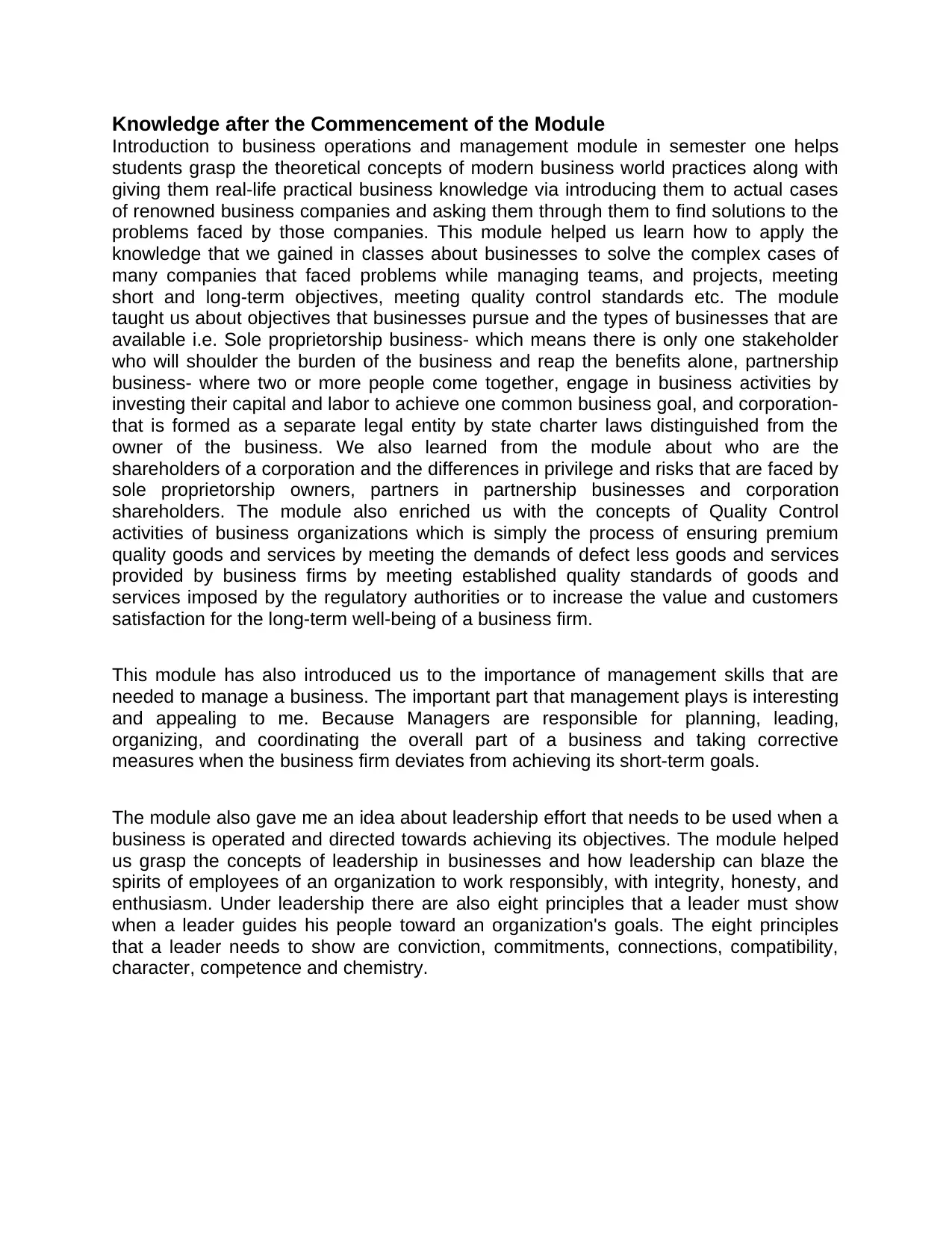
Knowledge after the Commencement of the Module
Introduction to business operations and management module in semester one helps
students grasp the theoretical concepts of modern business world practices along with
giving them real-life practical business knowledge via introducing them to actual cases
of renowned business companies and asking them through them to find solutions to the
problems faced by those companies. This module helped us learn how to apply the
knowledge that we gained in classes about businesses to solve the complex cases of
many companies that faced problems while managing teams, and projects, meeting
short and long-term objectives, meeting quality control standards etc. The module
taught us about objectives that businesses pursue and the types of businesses that are
available i.e. Sole proprietorship business- which means there is only one stakeholder
who will shoulder the burden of the business and reap the benefits alone, partnership
business- where two or more people come together, engage in business activities by
investing their capital and labor to achieve one common business goal, and corporation-
that is formed as a separate legal entity by state charter laws distinguished from the
owner of the business. We also learned from the module about who are the
shareholders of a corporation and the differences in privilege and risks that are faced by
sole proprietorship owners, partners in partnership businesses and corporation
shareholders. The module also enriched us with the concepts of Quality Control
activities of business organizations which is simply the process of ensuring premium
quality goods and services by meeting the demands of defect less goods and services
provided by business firms by meeting established quality standards of goods and
services imposed by the regulatory authorities or to increase the value and customers
satisfaction for the long-term well-being of a business firm.
This module has also introduced us to the importance of management skills that are
needed to manage a business. The important part that management plays is interesting
and appealing to me. Because Managers are responsible for planning, leading,
organizing, and coordinating the overall part of a business and taking corrective
measures when the business firm deviates from achieving its short-term goals.
The module also gave me an idea about leadership effort that needs to be used when a
business is operated and directed towards achieving its objectives. The module helped
us grasp the concepts of leadership in businesses and how leadership can blaze the
spirits of employees of an organization to work responsibly, with integrity, honesty, and
enthusiasm. Under leadership there are also eight principles that a leader must show
when a leader guides his people toward an organization's goals. The eight principles
that a leader needs to show are conviction, commitments, connections, compatibility,
character, competence and chemistry.
Introduction to business operations and management module in semester one helps
students grasp the theoretical concepts of modern business world practices along with
giving them real-life practical business knowledge via introducing them to actual cases
of renowned business companies and asking them through them to find solutions to the
problems faced by those companies. This module helped us learn how to apply the
knowledge that we gained in classes about businesses to solve the complex cases of
many companies that faced problems while managing teams, and projects, meeting
short and long-term objectives, meeting quality control standards etc. The module
taught us about objectives that businesses pursue and the types of businesses that are
available i.e. Sole proprietorship business- which means there is only one stakeholder
who will shoulder the burden of the business and reap the benefits alone, partnership
business- where two or more people come together, engage in business activities by
investing their capital and labor to achieve one common business goal, and corporation-
that is formed as a separate legal entity by state charter laws distinguished from the
owner of the business. We also learned from the module about who are the
shareholders of a corporation and the differences in privilege and risks that are faced by
sole proprietorship owners, partners in partnership businesses and corporation
shareholders. The module also enriched us with the concepts of Quality Control
activities of business organizations which is simply the process of ensuring premium
quality goods and services by meeting the demands of defect less goods and services
provided by business firms by meeting established quality standards of goods and
services imposed by the regulatory authorities or to increase the value and customers
satisfaction for the long-term well-being of a business firm.
This module has also introduced us to the importance of management skills that are
needed to manage a business. The important part that management plays is interesting
and appealing to me. Because Managers are responsible for planning, leading,
organizing, and coordinating the overall part of a business and taking corrective
measures when the business firm deviates from achieving its short-term goals.
The module also gave me an idea about leadership effort that needs to be used when a
business is operated and directed towards achieving its objectives. The module helped
us grasp the concepts of leadership in businesses and how leadership can blaze the
spirits of employees of an organization to work responsibly, with integrity, honesty, and
enthusiasm. Under leadership there are also eight principles that a leader must show
when a leader guides his people toward an organization's goals. The eight principles
that a leader needs to show are conviction, commitments, connections, compatibility,
character, competence and chemistry.
Paraphrase This Document
Need a fresh take? Get an instant paraphrase of this document with our AI Paraphraser
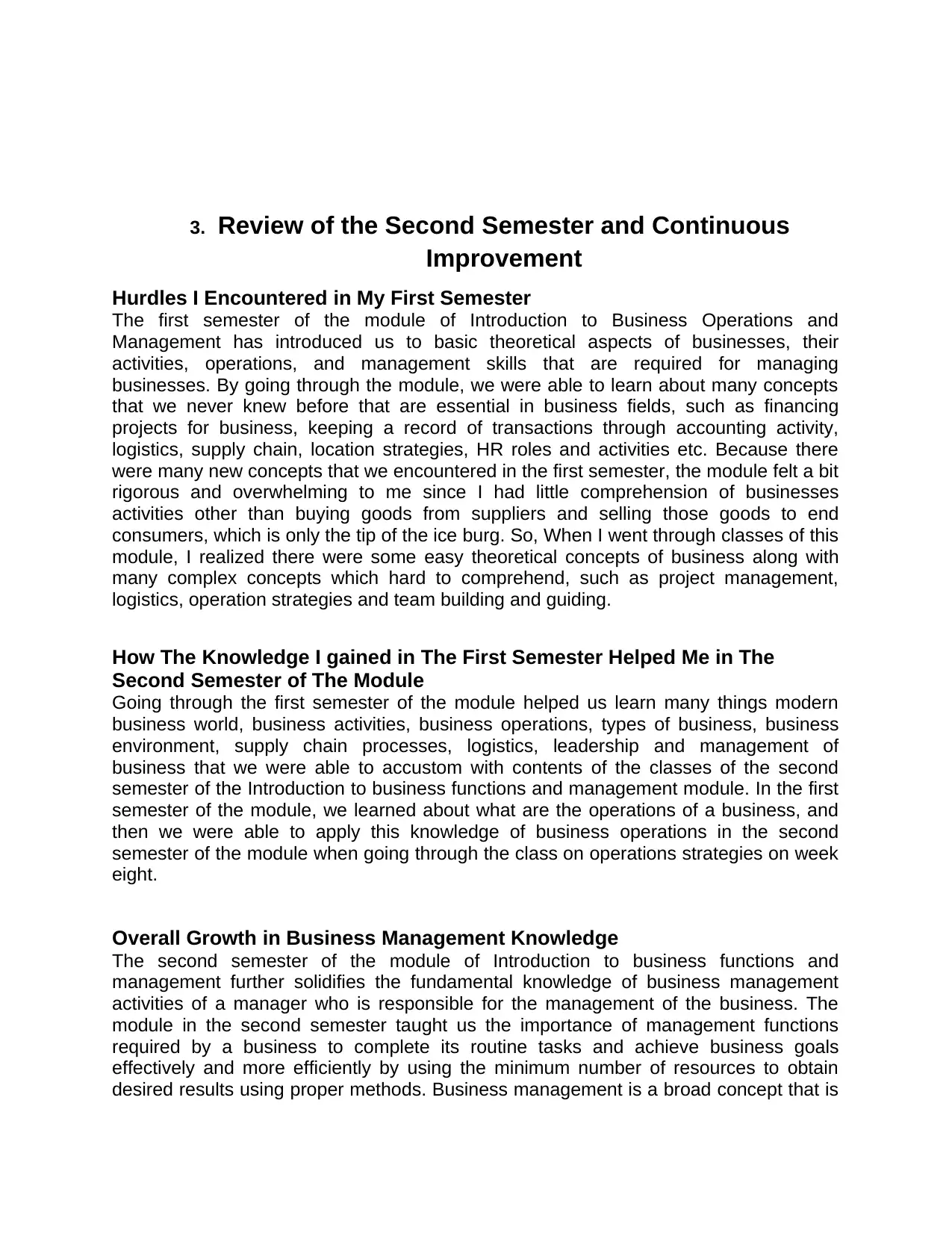
3. Review of the Second Semester and Continuous
Improvement
Hurdles I Encountered in My First Semester
The first semester of the module of Introduction to Business Operations and
Management has introduced us to basic theoretical aspects of businesses, their
activities, operations, and management skills that are required for managing
businesses. By going through the module, we were able to learn about many concepts
that we never knew before that are essential in business fields, such as financing
projects for business, keeping a record of transactions through accounting activity,
logistics, supply chain, location strategies, HR roles and activities etc. Because there
were many new concepts that we encountered in the first semester, the module felt a bit
rigorous and overwhelming to me since I had little comprehension of businesses
activities other than buying goods from suppliers and selling those goods to end
consumers, which is only the tip of the ice burg. So, When I went through classes of this
module, I realized there were some easy theoretical concepts of business along with
many complex concepts which hard to comprehend, such as project management,
logistics, operation strategies and team building and guiding.
How The Knowledge I gained in The First Semester Helped Me in The
Second Semester of The Module
Going through the first semester of the module helped us learn many things modern
business world, business activities, business operations, types of business, business
environment, supply chain processes, logistics, leadership and management of
business that we were able to accustom with contents of the classes of the second
semester of the Introduction to business functions and management module. In the first
semester of the module, we learned about what are the operations of a business, and
then we were able to apply this knowledge of business operations in the second
semester of the module when going through the class on operations strategies on week
eight.
Overall Growth in Business Management Knowledge
The second semester of the module of Introduction to business functions and
management further solidifies the fundamental knowledge of business management
activities of a manager who is responsible for the management of the business. The
module in the second semester taught us the importance of management functions
required by a business to complete its routine tasks and achieve business goals
effectively and more efficiently by using the minimum number of resources to obtain
desired results using proper methods. Business management is a broad concept that is
Improvement
Hurdles I Encountered in My First Semester
The first semester of the module of Introduction to Business Operations and
Management has introduced us to basic theoretical aspects of businesses, their
activities, operations, and management skills that are required for managing
businesses. By going through the module, we were able to learn about many concepts
that we never knew before that are essential in business fields, such as financing
projects for business, keeping a record of transactions through accounting activity,
logistics, supply chain, location strategies, HR roles and activities etc. Because there
were many new concepts that we encountered in the first semester, the module felt a bit
rigorous and overwhelming to me since I had little comprehension of businesses
activities other than buying goods from suppliers and selling those goods to end
consumers, which is only the tip of the ice burg. So, When I went through classes of this
module, I realized there were some easy theoretical concepts of business along with
many complex concepts which hard to comprehend, such as project management,
logistics, operation strategies and team building and guiding.
How The Knowledge I gained in The First Semester Helped Me in The
Second Semester of The Module
Going through the first semester of the module helped us learn many things modern
business world, business activities, business operations, types of business, business
environment, supply chain processes, logistics, leadership and management of
business that we were able to accustom with contents of the classes of the second
semester of the Introduction to business functions and management module. In the first
semester of the module, we learned about what are the operations of a business, and
then we were able to apply this knowledge of business operations in the second
semester of the module when going through the class on operations strategies on week
eight.
Overall Growth in Business Management Knowledge
The second semester of the module of Introduction to business functions and
management further solidifies the fundamental knowledge of business management
activities of a manager who is responsible for the management of the business. The
module in the second semester taught us the importance of management functions
required by a business to complete its routine tasks and achieve business goals
effectively and more efficiently by using the minimum number of resources to obtain
desired results using proper methods. Business management is a broad concept that is
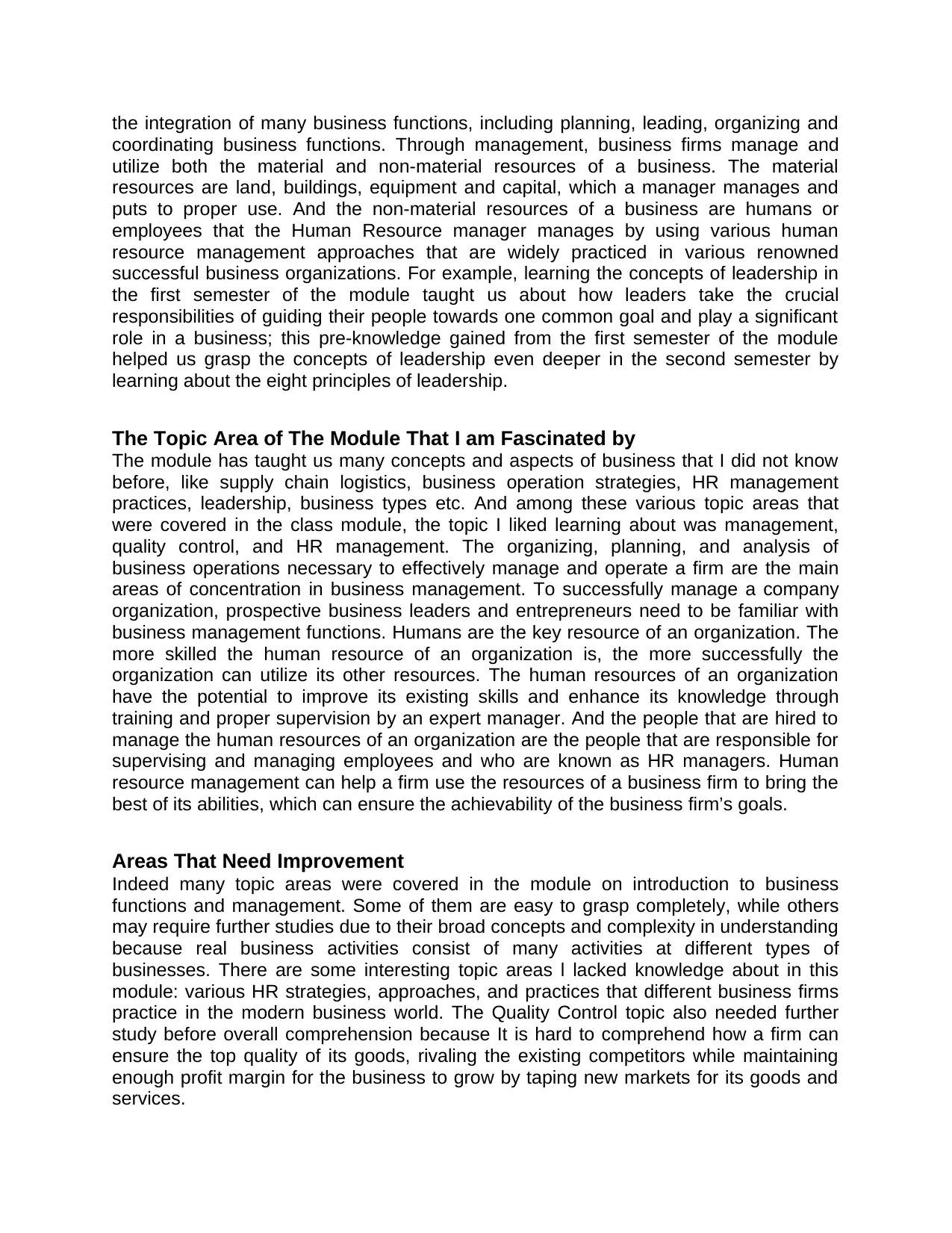
the integration of many business functions, including planning, leading, organizing and
coordinating business functions. Through management, business firms manage and
utilize both the material and non-material resources of a business. The material
resources are land, buildings, equipment and capital, which a manager manages and
puts to proper use. And the non-material resources of a business are humans or
employees that the Human Resource manager manages by using various human
resource management approaches that are widely practiced in various renowned
successful business organizations. For example, learning the concepts of leadership in
the first semester of the module taught us about how leaders take the crucial
responsibilities of guiding their people towards one common goal and play a significant
role in a business; this pre-knowledge gained from the first semester of the module
helped us grasp the concepts of leadership even deeper in the second semester by
learning about the eight principles of leadership.
The Topic Area of The Module That I am Fascinated by
The module has taught us many concepts and aspects of business that I did not know
before, like supply chain logistics, business operation strategies, HR management
practices, leadership, business types etc. And among these various topic areas that
were covered in the class module, the topic I liked learning about was management,
quality control, and HR management. The organizing, planning, and analysis of
business operations necessary to effectively manage and operate a firm are the main
areas of concentration in business management. To successfully manage a company
organization, prospective business leaders and entrepreneurs need to be familiar with
business management functions. Humans are the key resource of an organization. The
more skilled the human resource of an organization is, the more successfully the
organization can utilize its other resources. The human resources of an organization
have the potential to improve its existing skills and enhance its knowledge through
training and proper supervision by an expert manager. And the people that are hired to
manage the human resources of an organization are the people that are responsible for
supervising and managing employees and who are known as HR managers. Human
resource management can help a firm use the resources of a business firm to bring the
best of its abilities, which can ensure the achievability of the business firm’s goals.
Areas That Need Improvement
Indeed many topic areas were covered in the module on introduction to business
functions and management. Some of them are easy to grasp completely, while others
may require further studies due to their broad concepts and complexity in understanding
because real business activities consist of many activities at different types of
businesses. There are some interesting topic areas l lacked knowledge about in this
module: various HR strategies, approaches, and practices that different business firms
practice in the modern business world. The Quality Control topic also needed further
study before overall comprehension because It is hard to comprehend how a firm can
ensure the top quality of its goods, rivaling the existing competitors while maintaining
enough profit margin for the business to grow by taping new markets for its goods and
services.
coordinating business functions. Through management, business firms manage and
utilize both the material and non-material resources of a business. The material
resources are land, buildings, equipment and capital, which a manager manages and
puts to proper use. And the non-material resources of a business are humans or
employees that the Human Resource manager manages by using various human
resource management approaches that are widely practiced in various renowned
successful business organizations. For example, learning the concepts of leadership in
the first semester of the module taught us about how leaders take the crucial
responsibilities of guiding their people towards one common goal and play a significant
role in a business; this pre-knowledge gained from the first semester of the module
helped us grasp the concepts of leadership even deeper in the second semester by
learning about the eight principles of leadership.
The Topic Area of The Module That I am Fascinated by
The module has taught us many concepts and aspects of business that I did not know
before, like supply chain logistics, business operation strategies, HR management
practices, leadership, business types etc. And among these various topic areas that
were covered in the class module, the topic I liked learning about was management,
quality control, and HR management. The organizing, planning, and analysis of
business operations necessary to effectively manage and operate a firm are the main
areas of concentration in business management. To successfully manage a company
organization, prospective business leaders and entrepreneurs need to be familiar with
business management functions. Humans are the key resource of an organization. The
more skilled the human resource of an organization is, the more successfully the
organization can utilize its other resources. The human resources of an organization
have the potential to improve its existing skills and enhance its knowledge through
training and proper supervision by an expert manager. And the people that are hired to
manage the human resources of an organization are the people that are responsible for
supervising and managing employees and who are known as HR managers. Human
resource management can help a firm use the resources of a business firm to bring the
best of its abilities, which can ensure the achievability of the business firm’s goals.
Areas That Need Improvement
Indeed many topic areas were covered in the module on introduction to business
functions and management. Some of them are easy to grasp completely, while others
may require further studies due to their broad concepts and complexity in understanding
because real business activities consist of many activities at different types of
businesses. There are some interesting topic areas l lacked knowledge about in this
module: various HR strategies, approaches, and practices that different business firms
practice in the modern business world. The Quality Control topic also needed further
study before overall comprehension because It is hard to comprehend how a firm can
ensure the top quality of its goods, rivaling the existing competitors while maintaining
enough profit margin for the business to grow by taping new markets for its goods and
services.
⊘ This is a preview!⊘
Do you want full access?
Subscribe today to unlock all pages.

Trusted by 1+ million students worldwide
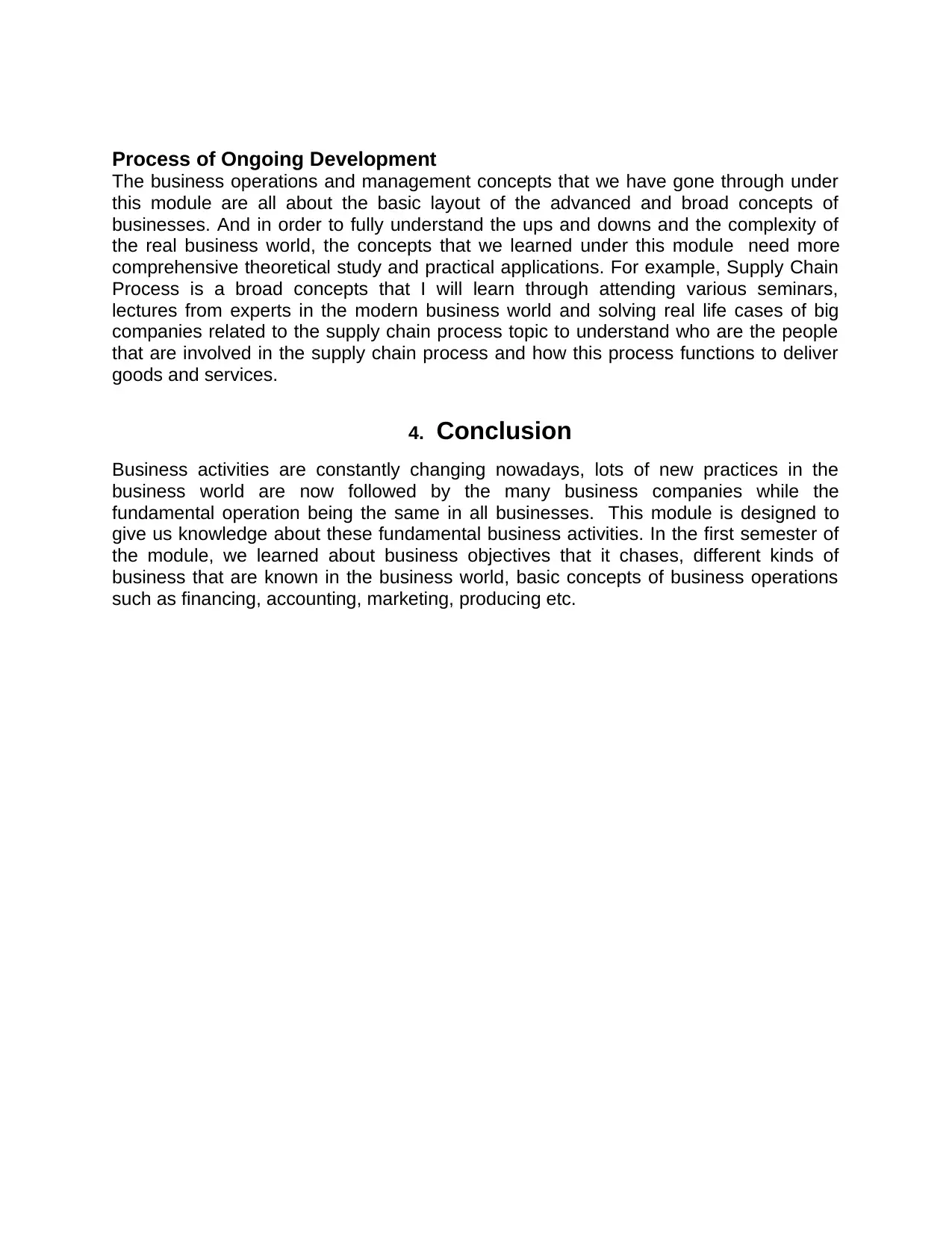
Process of Ongoing Development
The business operations and management concepts that we have gone through under
this module are all about the basic layout of the advanced and broad concepts of
businesses. And in order to fully understand the ups and downs and the complexity of
the real business world, the concepts that we learned under this module need more
comprehensive theoretical study and practical applications. For example, Supply Chain
Process is a broad concepts that I will learn through attending various seminars,
lectures from experts in the modern business world and solving real life cases of big
companies related to the supply chain process topic to understand who are the people
that are involved in the supply chain process and how this process functions to deliver
goods and services.
4. Conclusion
Business activities are constantly changing nowadays, lots of new practices in the
business world are now followed by the many business companies while the
fundamental operation being the same in all businesses. This module is designed to
give us knowledge about these fundamental business activities. In the first semester of
the module, we learned about business objectives that it chases, different kinds of
business that are known in the business world, basic concepts of business operations
such as financing, accounting, marketing, producing etc.
The business operations and management concepts that we have gone through under
this module are all about the basic layout of the advanced and broad concepts of
businesses. And in order to fully understand the ups and downs and the complexity of
the real business world, the concepts that we learned under this module need more
comprehensive theoretical study and practical applications. For example, Supply Chain
Process is a broad concepts that I will learn through attending various seminars,
lectures from experts in the modern business world and solving real life cases of big
companies related to the supply chain process topic to understand who are the people
that are involved in the supply chain process and how this process functions to deliver
goods and services.
4. Conclusion
Business activities are constantly changing nowadays, lots of new practices in the
business world are now followed by the many business companies while the
fundamental operation being the same in all businesses. This module is designed to
give us knowledge about these fundamental business activities. In the first semester of
the module, we learned about business objectives that it chases, different kinds of
business that are known in the business world, basic concepts of business operations
such as financing, accounting, marketing, producing etc.
Paraphrase This Document
Need a fresh take? Get an instant paraphrase of this document with our AI Paraphraser

References
1 out of 8
Related Documents
Your All-in-One AI-Powered Toolkit for Academic Success.
+13062052269
info@desklib.com
Available 24*7 on WhatsApp / Email
![[object Object]](/_next/static/media/star-bottom.7253800d.svg)
Unlock your academic potential
Copyright © 2020–2026 A2Z Services. All Rights Reserved. Developed and managed by ZUCOL.




